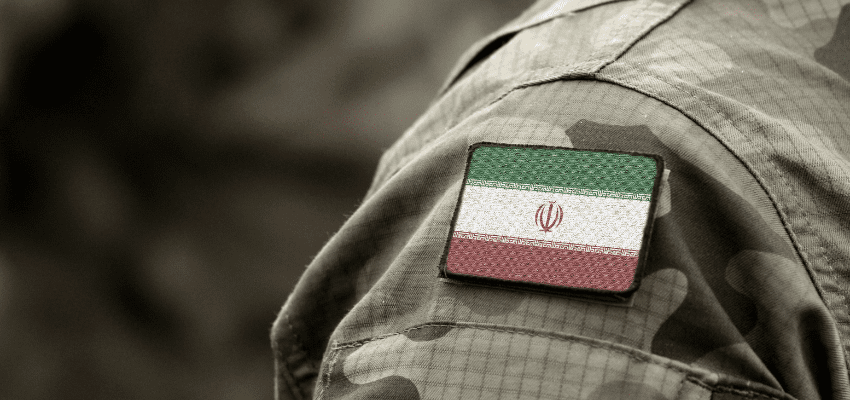This article originally appeared in the Hub.
Casey Babb, April 17, 2024
For the first time ever, Tehran has attacked Israel from Iranian soil.
Firing hundreds of projectiles across the skies of the Middle East into Israeli airspace, including dozens of ballistic missiles and hundreds of unmanned kamikaze drones, Tehran’s genocidal regime has pushed the region to the brink of all-out war.
Yet, despite the fact Iran has repeatedly issued threats of wiping Israel off the map, many analysts, scholars, and politicians seem taken aback by Iran’s brazen attack. This feigned surprise isn’t fooling anyone. The West’s willfully blind approach to Iran not only enabled this assault on Israel, it also led to the barbaric terrorist attacks in Israel on October 7. If these atrocities and belligerent acts of aggression aren’t enough to wake us up to the dangers of Iran then what will?
For over forty years, Iran has spent every ounce of its social, political, economic, and military capital on exporting its radical ideology, harvesting terrorism, and obtaining the nuclear bomb—all with two primary objectives in mind: eroding American influence and destroying Israel.
Since at least the 1960s, when Iran’s first Supreme Leader Ayatollah Ruhollah Khomeini began nudging his country towards an obsession with antisemitic, anti-Israel, and anti-American thinking, Iran’s ruling elite has sought to mobilize regional support around the idea of Tehran as a transformative force committed to Muslim liberation across the globe.
As one analyst wrote in 2019, “Khomeini’s revolution was supposed to span the Muslim world. He viewed all Muslims in the Middle East as subjugated masses to be liberated. Arab monarchs and secular leaders were to be displaced by Islamist parties that shared his view that religion should inform politics.” Underpinning this vision, of course, was and is Iran’s view that the Islamic world’s primary oppressors and enemies are America and Israel—or, as Khomeini described them, Big Satan and Little Satan.
This way of thinking, which has informed Iranian decision-making since Khomeini took control of Iran in 1979, has not only endured, it has accelerated as Tehran has gradually moved from talking tough to taking lives. From funding Islamic terrorist organizations such as Hamas, Hezbollah, and the Palestinian Islamic Jihad, to pushing towards nuclear breakout, Iran has become one of the most deadly and destabilizing regimes in the world. In fact, without Iranian weapons, financial support, training, and aggressive propaganda campaigns, everything from the Second Lebanon War to October 7 would have never happened.
Unfortunately, for a variety of reasons, Western nations have, by and large, turned a blind eye to Iran’s deadly fundamentalist ideology and the regime’s appalling activities—activities that have led to the loss of untold thousands of lives throughout the Middle East and beyond.
This is not to suggest our collective approach to Iran—or lack thereof—is motivated by nefarious intentions. Rather, it is likely due to a combination of factors, including existing beliefs that Israel is more powerful than it really is, a deep-seated view, conscious or unconscious, that Jerusalem is to blame for regional hostilities, and an issue that has plagued Western decisionmakers for ages: ignoring or belittling what our enemies tell us.
From Adolf Hitler’s antisemitic diatribes which he issued for years before the Holocaust, to Osama bin Laden’s jihadi declaration against America half a decade before 9/11, to Putin’s rhetoric on Ukraine, our adversaries tell us time and time again what they plan to do—and then they do it. Nearly twenty years ago, former Iranian President Mahmoud Ahmadinejad said “The occupying regime of Jerusalem must be disappeared from the page of time.” Yet, in the time since, virtually no attempts have been made to curb Iranian aggression towards Israel. Ultimately, it would appear that most in the West either aren’t listening to Iran or they aren’t taking Tehran’s words seriously.
In the same way, we would never suggest Russia is Ukraine’s problem to address alone, we cannot expect Israel to confront and contain Iranian acts of war in isolation. Further, the fact Israel, alongside many of its allies, was able to prevent the majority of Iran’s missiles from raining down on its citizens does not diminish the severity of what has happened.
All told, Iran’s attack on Israel is not simply an attack on the Jewish state. At its core, it is an attack on liberalism, on democracy, and on all that we stand for. The Iranian regime has made their intentions known for virtually half a century. If we don’t start listening now—if we abandon Israel—we will pay a very dear price later.
Casey Babb is a Senior Fellow with the Macdonald Laurier Institute in Ottawa, an International Fellow with the Institute for National Security Studies in Tel Aviv, and an Associate Fellow with the Royal United Services Institute in London, England. He teaches courses on terrorism and global security at the Norman Paterson School of International Affairs, in Ottawa.






